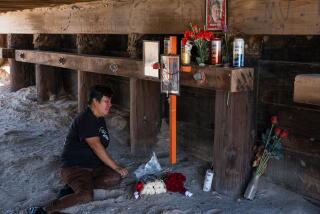Denny Rescuers Avoid Spotlight, Stick Together
- Share via
As symbols of the riots, they are indelible. As people, they are barely known. Even some of their neighbors do not know who they are and what they have done.
In the 1 1/2 years since four Angelenos, watching television in different locations, rushed to the intersection of Florence and Normandie avenues to rescue Reginald O. Denny, their extraordinary courage has been overshadowed by the powerful images of mob violence. Damian Monroe Williams is much more of a household name than Bobby Green.
But it was because of trucker Green and Terri Barnett, Titus Murphy and Lei Yuille that Denny is alive, that Williams and co-defendant Henry Keith Watson stood accused of attempted murder rather than murder. That fact has not been lost on the people who have awarded the four rescuers with plaques at City Hall, remembered them as heroes in newspaper retrospectives, invited them to dinners and courted them for the movie rights to their stories.
But, for the most part, the routine of their lives has changed very little.
Yuille, 38, the first to arrive at the intersection, is still working as a nutritionist. Murphy is still unemployed as an aerospace engineer and expects that he may never work again in that field in Southern California. Barnett, who designs displays in stores, keeps her eye out for more work and raises a young daughter.
Only Green’s professional life has changed substantially. It was Green, 30, who ran into the intersection, up to the cab of Denny’s truck--momentarily frightening Denny’s other rescuers--and announced that he was a truck driver and that he could drive the injured man to the hospital. A couple months later, Green, who was arguably most responsible for saving Denny’s life, got a new job trucking for Denny’s company, Transit Mixed Concrete Co.
As Green drove Denny’s truck out of the intersection that day, the other three did what they could to help. Yuille calmed and comforted Denny as she sat next to him in the truck on the way to the hospital.
Murphy and Barnett, who have known each other since the 1980s when they were working for Northrop’s Electronics Systems Division in Hawthorne, were watching the assault on television together when they decided to take action. When they arrived, Barnett drove her car ahead of Denny’s truck to clear a path through the traffic and confusion; Murphy rode on the truck’s running board.
Perhaps the biggest change in the lives of the four is the bond forged among them. Television and movie producers have found them moderately alluring, so there have been a number of offers. Usually before the rescuers do anything, they consult with each other. “That’s the best way,” Green said. “All for one and one for all.”
Murphy--who does not have a regular job--said he acts as the coordinator. “I usually bring the idea to the group,” Murphy said. “We have to think as a whole--just like we did that day.”
And because they do not easily divulge their discussions, they have become something of their own secret society. Some of their choices seem obvious, some odd. After the riots, they did Phil Donahue. But last March, they did a quirky CBS-TV show called “How’d They Do That?” which explores the background of unusual events. They sold movie rights to their stories to Suzanne de Passe--the producer responsible for the television mini-series last year on Michael Jackson’s family--and Dolores Robinson, a well-known Hollywood manager and producer.
To a certain extent, they seem stunned by the interest in them. Green’s wife, Vera, said: “He never knew all this would come out of what he did.” Green declined to attend a City Hall ceremony with the other heroes of the riots.
“I pushed Bobby to do some of the things,” Vera Green said. “I felt he deserved recognition. He’s gotten a lot. He’s been to Utah. They gave him the key to the city in Opa Locka, Florida.”
Ironically, as fearless as they seemed that day, wading into a riot, they are now much more cautious. Most of it comes from living in a part of town still smoldering with the same anger underlying the riots and from their own uncertainty over how their acts of heroism were received by some.
Barnett zealously guards her address, not even divulging it to the police who picked her up to take her to court to testify in the Denny beating trial. Instead, they called for her at a relative’s house.
“I live too close to Normandie and Florence to be giving out my address,” Barnett said.
“We do live in South-Central,” said Vera Green. “Maybe people feel like if Bobby hadn’t gone down there, there wouldn’t be any trial.”
Although Murphy, Barnett and Green spoke briefly on the phone, Yuille did not return numerous phone calls. All four declined to be extensively interviewed for this story.
“We’re geared up for a movie, we don’t want to overdo it,” said Murphy when he initially was approached for an interview.
Later, after they had consulted with each other, Barnett said: “We’re doing something else.” She would not elaborate, saying: “It’s kind of personal but . . . we will profit from it--not just the person writing it.”
So far, it does not appear that they have made much money. Producer Robinson will not say what the foursome were paid for the movie rights, but another source estimates that it was a few thousand dollars apiece.
“They’re not making a ton of money,” Robinson said. “These guys are not cashing in, but if someone should cash in, they should. They put themselves on the line. . . . These guys didn’t go out to save someone’s life to see if they could exploit it.”
Robinson met the four when they were being given awards by Show Coalition, an organization of entertainment people who hold forums and events on political and social issues.
“I thought their story should be told in a non-exploitative manner, in a way that they would be proud of,” Robinson said. “A script is pulling together as we speak.”
The proposed two-hour television movie--just a concept at this point--would follow the four from the time they saw the beating on television through the rest of the day.
For their appearances on “How’d They Do That?” the rescuers each got less than $500, not as a fee but as compensation for taking time from their jobs. The show featured interviews with the rescuers as well as a reunion--not with Denny, but with his truck.
Explaining why their stories fit the show’s format, executive producer Eric Schotz said: “They had a positive story to tell, and no one had told that story. All you heard about were the kids in jail for beating Reginald Denny.”
More to Read
Sign up for Essential California
The most important California stories and recommendations in your inbox every morning.
You may occasionally receive promotional content from the Los Angeles Times.














